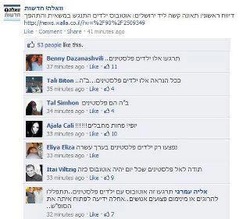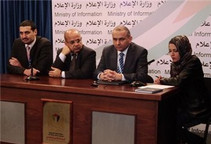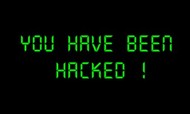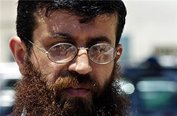16 feb 2012
Israelis celebrate death of Palestinian children killed in accident

(click to enlarge)
Ten Palestinian children were killed and 20 wounded on Thursday morning after an Israeli truck carrying a fuel tank crashed into the school bus transporting the kindergarten children near the Qalandia checkpoint in Ramallah.
The bus carrying the children collided with the truck at an intersection in Jaba'a, overturned, and caught on fire.
Ten children immediately died and at least 20 were injured, eight of whom are in critical condition, according to medical officials with the Palestinian Red Cross.
Palestinian Authority President Mahmoud Abbas has declared three days of mourning.
Ramallah-based journalist Diana Alzeer said the collision was likely an accident due to wet weather, and not politically motivated.
In Bethlehem, a 15-year-old boy died this morning after a truck skidded on a slippery road and ran the boy over.
A statement released by the police said they have opened an investigation and confirmed that the boy died on the spot. Emergency crews arrived to the scene and transferred the boy's body to a hospital in Beit Jala.
Israelis on Facebook were celebrating the deaths of the Palestinian children, writing derogatory statements on a wall of a news post regarding the accident.
The Israeli comments have gone viral on Twitter, shocking users into disbelief at the level of racism and hatred directed towards the deceased Palestinian children.
Israel maintains a military occupation of the West Bank and Jerusalem, imposing harsh restrictions on indigenous Palestinians while providing privileges to illegal Jewish settlers.
Palestinians are frequently attacked and harassed by settlers as well as the Israeli military, often with impunity.
Ten Palestinian children were killed and 20 wounded on Thursday morning after an Israeli truck carrying a fuel tank crashed into the school bus transporting the kindergarten children near the Qalandia checkpoint in Ramallah.
The bus carrying the children collided with the truck at an intersection in Jaba'a, overturned, and caught on fire.
Ten children immediately died and at least 20 were injured, eight of whom are in critical condition, according to medical officials with the Palestinian Red Cross.
Palestinian Authority President Mahmoud Abbas has declared three days of mourning.
Ramallah-based journalist Diana Alzeer said the collision was likely an accident due to wet weather, and not politically motivated.
In Bethlehem, a 15-year-old boy died this morning after a truck skidded on a slippery road and ran the boy over.
A statement released by the police said they have opened an investigation and confirmed that the boy died on the spot. Emergency crews arrived to the scene and transferred the boy's body to a hospital in Beit Jala.
Israelis on Facebook were celebrating the deaths of the Palestinian children, writing derogatory statements on a wall of a news post regarding the accident.
The Israeli comments have gone viral on Twitter, shocking users into disbelief at the level of racism and hatred directed towards the deceased Palestinian children.
Israel maintains a military occupation of the West Bank and Jerusalem, imposing harsh restrictions on indigenous Palestinians while providing privileges to illegal Jewish settlers.
Palestinians are frequently attacked and harassed by settlers as well as the Israeli military, often with impunity.
Israelis on Facebook celebrating the death of Palestinian children

(click to enlarge)
Following the news on the tragic accident today on Jaba road near Ramallah, due to clash of track with school bus, where at least nine children and one teacher were killed and tens were injuried, Israeli comments on facebook, were inhumane to say the least.
Comments on Israeli news website Walla’s post on it’s Facebook page about the accident, showed despicable satisfaction and celebration by Israelis and a disgraceful wish there will be more of such:
Benny: Calm down, they are Palestinian Children.
Tali: It seems like they are Palestinian children.. Thank God..
Tal: Thank God they are Palestinians
Ajala: Great less terrorists!!!!
Eliya: Only Palestinian children were injured about ten.
Itai: Thank God its Palestinians, let it be such bus every day.
Aleyah: calm down, Its a bus with Palestinian children, lets pray there will be deaths, or at least severe injuries, this is great news to start the day with.
End of translation.
Please note the likes on each one of the racist and hateful comments.
And no one tell me this is exception and not the Israeli mainstream.
Following the news on the tragic accident today on Jaba road near Ramallah, due to clash of track with school bus, where at least nine children and one teacher were killed and tens were injuried, Israeli comments on facebook, were inhumane to say the least.
Comments on Israeli news website Walla’s post on it’s Facebook page about the accident, showed despicable satisfaction and celebration by Israelis and a disgraceful wish there will be more of such:
Benny: Calm down, they are Palestinian Children.
Tali: It seems like they are Palestinian children.. Thank God..
Tal: Thank God they are Palestinians
Ajala: Great less terrorists!!!!
Eliya: Only Palestinian children were injured about ten.
Itai: Thank God its Palestinians, let it be such bus every day.
Aleyah: calm down, Its a bus with Palestinian children, lets pray there will be deaths, or at least severe injuries, this is great news to start the day with.
End of translation.
Please note the likes on each one of the racist and hateful comments.
And no one tell me this is exception and not the Israeli mainstream.
|
UPDATE February 17th
later on I found this screen shot on an Arab local website Bokra from Israeli Prime Minister, Benjamen Netanyahu’s officila Facebook page: Here is the translation of some racist and gloating comments on his statement offering aid for PA: Itzik: They will ask for money, since money is more important for them than children who died. Shlomi: He should offer them Baklawa* hhhhhhhhhhhhh Aourya: Let the Arabs die, why would we offer them help, let them handle it themselves Erez: Can we send another trailer? Riki: Another 2 trailers hhhhhhhhhh Eliran: I would send a convoy of double trailers to wipe out all these shits End of translation. |
*Baklawa is an Arab sweet, served usually in joyful events
Haaretz reported yesterday on these racist comments including similar ones on the Israeli police Facebook page, which could not be found.
Israelis on facebook are celebrating the death of Palestinian children in accident today.
Haaretz reported yesterday on these racist comments including similar ones on the Israeli police Facebook page, which could not be found.
Israelis on facebook are celebrating the death of Palestinian children in accident today.
Update: 10 children killed in bus crash

RAMALLAH (Ma’an) -- At least ten Palestinian schoolchildren were killed and 42 injured as a school bus collided with an Israeli truck in East Jerusalem on Thursday morning.
Palestinian police said the bus collided with a truck near Jaba, northeast Jerusalem, causing it to flip over. The bus was on its way to Ramallah with primary school students from the East Jerusalem neighborhood of Anata.
The Red Crescent said that ambulances had transferred a large number of injured people to hospital. At least eight are said to be in a serious condition.
Seven bodies of the deceased have been taken to the Palestinian Medical Clinic and three are at the Hadassah hospital.
Both Palestinian and Israeli emergency services were present at the scene of the accident.
"Firefighters began to take bodies out of the bus. We saw there was nothing more to be done," said Shalom Galil, an Israeli paramedic at the scene.
President Abbas has announced three days of mourning for victims of the crash.
Palestinian police said the bus collided with a truck near Jaba, northeast Jerusalem, causing it to flip over. The bus was on its way to Ramallah with primary school students from the East Jerusalem neighborhood of Anata.
The Red Crescent said that ambulances had transferred a large number of injured people to hospital. At least eight are said to be in a serious condition.
Seven bodies of the deceased have been taken to the Palestinian Medical Clinic and three are at the Hadassah hospital.
Both Palestinian and Israeli emergency services were present at the scene of the accident.
"Firefighters began to take bodies out of the bus. We saw there was nothing more to be done," said Shalom Galil, an Israeli paramedic at the scene.
President Abbas has announced three days of mourning for victims of the crash.
15 feb 2012
'Israeli went on shopping spree with Saudi hacker's help'

Police arrest 15-year-old Jerusalem resident who allegedly purchased electronic goods with stolen credit card details provided to him by the notorious OxOmar.
Jerusalem Police arrested on Tuesday a 15-year-old local on suspicion that he used stolen credit card details provided by Saudi hacker OxOmar to purchase goods worth tens of thousands of shekels, Ynet reported.
The investigation found that the teenager contacted the hacker online and asked him for the details of credit cards belonging to Israelis. The hacker obliged and sent him the details of four credit cards.
Police say the boy used two of the cards to purchase electronic equipment and other goods which he had ordered online.
The suspect collected the goods at a post office in Jerusalem's Givat Shaul neighborhood, according to police.
Police launched the investigation following a complaint lodged by credit card companies, and found some of the merchandise during a search of the boy's home. Investigators said he sold the remaining products.
The boy's mother was also arrested. Police believe she may have been involved in some of the purchases.
The boy's attorney said before a court hearing on the extension of his remand that "he did not know he was communicating with the Saudi hacker – it happened randomly."
Police said the boy admitted he had purchased goods with the stolen credit card details and that he also purchased vacation packages in Israel and abroad.
Jerusalem Police arrested on Tuesday a 15-year-old local on suspicion that he used stolen credit card details provided by Saudi hacker OxOmar to purchase goods worth tens of thousands of shekels, Ynet reported.
The investigation found that the teenager contacted the hacker online and asked him for the details of credit cards belonging to Israelis. The hacker obliged and sent him the details of four credit cards.
Police say the boy used two of the cards to purchase electronic equipment and other goods which he had ordered online.
The suspect collected the goods at a post office in Jerusalem's Givat Shaul neighborhood, according to police.
Police launched the investigation following a complaint lodged by credit card companies, and found some of the merchandise during a search of the boy's home. Investigators said he sold the remaining products.
The boy's mother was also arrested. Police believe she may have been involved in some of the purchases.
The boy's attorney said before a court hearing on the extension of his remand that "he did not know he was communicating with the Saudi hacker – it happened randomly."
Police said the boy admitted he had purchased goods with the stolen credit card details and that he also purchased vacation packages in Israel and abroad.
13 feb 2012
'Electronic war on Palestine' since UNESCO membership

The head of the Palestinian telecommunications provider said Sunday that hackers have escalated cyber attacks on Palestinian websites and internet servers since Palestine joined UNESCO three months ago.
In comments on PA TV program 'Facing the Media' Paltel Chief Executive Ammar al-Ikir said: "There is an electronic war against Palestine, which began after Palestine became a member of UNESCO."
He called on internet companies to collaborate over protection mechanisms to fend off hackers. A number of Palestinian banks have been recently subject to unsuccessful hacks, he said.
PA communication and information technology minister Mashhour Abu Dakka told the program "we were able to stop 99 percent of the hackers’ attacks and only a few of them were successful."
On Wednesday PalTel issued a statement saying that its' service is facing "interruptions" which are slowing down the connection, and last week several Palestinian news sites were temporarily shut down by hackers, including sites affiliated to Ma'an.
"This attack will not be the last, and the hacking will not stop," Abu Dakka said, calling Wednesday's shut down a massive loss that tricked current systems by using new tactics.
The ministry is holding talks with the telecommunications company to prevent further attacks, and anyone discovered to be involved in hacking attacks will be punished under the law, he added.
In comments on PA TV program 'Facing the Media' Paltel Chief Executive Ammar al-Ikir said: "There is an electronic war against Palestine, which began after Palestine became a member of UNESCO."
He called on internet companies to collaborate over protection mechanisms to fend off hackers. A number of Palestinian banks have been recently subject to unsuccessful hacks, he said.
PA communication and information technology minister Mashhour Abu Dakka told the program "we were able to stop 99 percent of the hackers’ attacks and only a few of them were successful."
On Wednesday PalTel issued a statement saying that its' service is facing "interruptions" which are slowing down the connection, and last week several Palestinian news sites were temporarily shut down by hackers, including sites affiliated to Ma'an.
"This attack will not be the last, and the hacking will not stop," Abu Dakka said, calling Wednesday's shut down a massive loss that tricked current systems by using new tactics.
The ministry is holding talks with the telecommunications company to prevent further attacks, and anyone discovered to be involved in hacking attacks will be punished under the law, he added.
12 feb 2012
Jerusalem court starts debating meaning of Fascism as Im Tirtzu sues activists

Rightist organization sues seven people behind Facebook page called 'Im Tirtzu - Fascists,'claiming libel; defense stands by statement.
What is fascism? How is the word "fascist" perceived in the current Israeli discourse? And does the group Im Tirtzu meet the definition of a fascist movement? These are the questions which the Jerusalem District Court will deliberate in an upcoming libel suit.
Im Tirtzu styles itself as an "extra-parliamentary movement that works to strengthen and advance the values of Zionism in Israel." It has a filed a suit against the seven people behind a Facebook page called "Im Tirtzu - Fascists," and the defense is due to present its depositions on Sunday. The page's activists, being sued for NIS 2.6 million, are defending themselves with the argument that they are merely speaking the truth, in an effort to prove that Im Tirtzu contains fascist elements.
They add that presenting the group as fascist is protected by the principle of freedom of expression, and that theirs is an opinion they are entitled to hold and express.
One of the depositions comes from Prof. Zeev Sternhell, an internationally-recognized expert on fascism. He concluded that Im Tirtzu's ideology and actions contained elements of fascism.
There is also a deposition from journalist and spoken Hebrew expert Rubik Rosenthal, who concludes that in the current Israeli discourse, the term "fascist" is being used by both right and left and does not necessarily refer to the historic meaning of the term.
Another interesting deposition comes from Tomer Persico, a journalist writing a Ph.D. in philosophy. Persico describes a conversation he had with one of Im Tirtzu's leaders, Ronen Shuval, in which Shuval admitted to being influenced by German romanticism's ideologues, regarded as the precursors of European fascism.
Im Tirtzu filed its suit a year ago against the seven owners of the Facebook page: Roy Yellin, Yuval Yellin, Edan Ring, David Remez, Noam Livne, Tal Niv and Ari Remez. The movement's suit argues that the aim of the seven is to silence the activities of Im Tirtzu by delegitimizing it.
In their defense, the group says that Im Tirtzu, in its overall activities and particularly in its campaign against the New Israel Fund and human rights organizations, is characterized by nationalist and also fascist elements. They also say that the purpose of the suit aims to threaten and silence criticism.
The defendants, all left-wing activists, say the suit may result in their financial demise, launching a website to collect contributions that would cover their legal expenses.
In his deposition, Prof. Sternhell says there is no clear and unequivocal definition of a fascist movement, and that no movement in history has all the components of the definition.
In texts written by Shuval, Sternhell sees a clear expression of fascist thinking. References to the nation as an organic body, Sternhell says, are fundamentals of fascist thought. Other signs of fascist thought include the view of an atrophied West and the sense that the situation in Israel is an emergency requiring extremist action and struggle against the "traitors."
Sternhell points out that a decision on whether a movement is fascist or not must be based not on comparison with a classical fascist state but with movements at their early stages, and which later turned the state into a fascist one.
"If we take into account that Im Tirtzu is just beginning and is operating in a society where rejection of the fundamentals of liberalism is perceived to be a sin, then it is showing early and troubling signs of fascist potential," Sternhell writes.
Attorney Nadav Haetzni, representing Im Tirtzu, said: "This is an attempt by members of the radical left to publicly destroy Im Tirtzu, which is a Zionist and Democratic movement in line with the spirit of Zeev Benjamin Herzl." He charged that the defendants have violated the law because their actions are slanderous and libelous.
What is fascism? How is the word "fascist" perceived in the current Israeli discourse? And does the group Im Tirtzu meet the definition of a fascist movement? These are the questions which the Jerusalem District Court will deliberate in an upcoming libel suit.
Im Tirtzu styles itself as an "extra-parliamentary movement that works to strengthen and advance the values of Zionism in Israel." It has a filed a suit against the seven people behind a Facebook page called "Im Tirtzu - Fascists," and the defense is due to present its depositions on Sunday. The page's activists, being sued for NIS 2.6 million, are defending themselves with the argument that they are merely speaking the truth, in an effort to prove that Im Tirtzu contains fascist elements.
They add that presenting the group as fascist is protected by the principle of freedom of expression, and that theirs is an opinion they are entitled to hold and express.
One of the depositions comes from Prof. Zeev Sternhell, an internationally-recognized expert on fascism. He concluded that Im Tirtzu's ideology and actions contained elements of fascism.
There is also a deposition from journalist and spoken Hebrew expert Rubik Rosenthal, who concludes that in the current Israeli discourse, the term "fascist" is being used by both right and left and does not necessarily refer to the historic meaning of the term.
Another interesting deposition comes from Tomer Persico, a journalist writing a Ph.D. in philosophy. Persico describes a conversation he had with one of Im Tirtzu's leaders, Ronen Shuval, in which Shuval admitted to being influenced by German romanticism's ideologues, regarded as the precursors of European fascism.
Im Tirtzu filed its suit a year ago against the seven owners of the Facebook page: Roy Yellin, Yuval Yellin, Edan Ring, David Remez, Noam Livne, Tal Niv and Ari Remez. The movement's suit argues that the aim of the seven is to silence the activities of Im Tirtzu by delegitimizing it.
In their defense, the group says that Im Tirtzu, in its overall activities and particularly in its campaign against the New Israel Fund and human rights organizations, is characterized by nationalist and also fascist elements. They also say that the purpose of the suit aims to threaten and silence criticism.
The defendants, all left-wing activists, say the suit may result in their financial demise, launching a website to collect contributions that would cover their legal expenses.
In his deposition, Prof. Sternhell says there is no clear and unequivocal definition of a fascist movement, and that no movement in history has all the components of the definition.
In texts written by Shuval, Sternhell sees a clear expression of fascist thinking. References to the nation as an organic body, Sternhell says, are fundamentals of fascist thought. Other signs of fascist thought include the view of an atrophied West and the sense that the situation in Israel is an emergency requiring extremist action and struggle against the "traitors."
Sternhell points out that a decision on whether a movement is fascist or not must be based not on comparison with a classical fascist state but with movements at their early stages, and which later turned the state into a fascist one.
"If we take into account that Im Tirtzu is just beginning and is operating in a society where rejection of the fundamentals of liberalism is perceived to be a sin, then it is showing early and troubling signs of fascist potential," Sternhell writes.
Attorney Nadav Haetzni, representing Im Tirtzu, said: "This is an attempt by members of the radical left to publicly destroy Im Tirtzu, which is a Zionist and Democratic movement in line with the spirit of Zeev Benjamin Herzl." He charged that the defendants have violated the law because their actions are slanderous and libelous.
Palestine servers 'hacked from Italy'

A cyber attack on the Palestinian internet network on Saturday evening originated in Italy, the PA minister of communication and information technology Mashour Abu Daqqa told Ma’an.
Palestinian servers and websites have been disabled by a series of cyber attacks in recent months. Abu Daqqa said internet communications had been disturbed by hackers for three months, but the attacks on Palestinian internet providers since Wednesday used new tactics to shut down servers.
Earlier, presidential communications advisor Sabri Saidam said huge quantities of emails are being sent in order to disable Palestinian servers.
Abu Qaqqa said his ministry will ask Palestinian security services to coordinate with Italian security to combat the attack.
While the server is being hacked from abroad, recent attacks on Palestinian websites are from local cyber activists, he said.
Last week, hackers shut down Wafa, the Palestinian Authority's official news agency, and several websites affiliated with Ma'an Network, including its news page.
The ministry of communication and information technology have called the national team for information security to convene Sunday morning, he said.
Due to Israel's occupation, Palestine does not have its own connection to the internet but hires lines from international companies, increasing the country's vulnerability to foreign cyber attack, he added.
Palestinian servers and websites have been disabled by a series of cyber attacks in recent months. Abu Daqqa said internet communications had been disturbed by hackers for three months, but the attacks on Palestinian internet providers since Wednesday used new tactics to shut down servers.
Earlier, presidential communications advisor Sabri Saidam said huge quantities of emails are being sent in order to disable Palestinian servers.
Abu Qaqqa said his ministry will ask Palestinian security services to coordinate with Italian security to combat the attack.
While the server is being hacked from abroad, recent attacks on Palestinian websites are from local cyber activists, he said.
Last week, hackers shut down Wafa, the Palestinian Authority's official news agency, and several websites affiliated with Ma'an Network, including its news page.
The ministry of communication and information technology have called the national team for information security to convene Sunday morning, he said.
Due to Israel's occupation, Palestine does not have its own connection to the internet but hires lines from international companies, increasing the country's vulnerability to foreign cyber attack, he added.
2 feb 2012
Pro-Palestinian hackers claim to publish details of 26,000 more Israeli credit cards

Claim comes from the international hacking group, 'Team Poison', who initiated an organized attack on Israeli websites and citizens.
An international group of hackers claimed Thursday to have published the details of 26,000 credit cards overnight, in the latest addition to a series of cyber attacks between pro-Palestinian and pro-Israeli hackers.
The group, "Team Poison", is one of the initiators of "OPfreepalestin", an organized attack on Israeli websites and citizens, and is considered to be one of the movement's most skilled groups.
Team Poison was established in 2009 with the intention of acting in cyberspace against Israeli and American targets. Since then, it has cracked numerous websites, including those of Internet service providers, the United Nations, hi-tech companies and even the systems of countries who have ties with Israel.
Over the past month, pro-Palestinian and pro-Israeli hackers have been battling in cyberspace.
Two weeks ago, hackers shut down both the Tel Aviv Stock Exchange (TASE) and El Al’s respective websites. The attacks came one day after a hacker network threatened to carry out attacks on both sites and Hamas called for harsher hacking attempts against Israeli websites.
The network, which goes by the name “nightmare group,” was able to cause severe problems for both sites. By 10 A.M., TASE's website was only partially functioning, while El Al’s website did not function at all.
The following day, Israeli hackers brought down the websites of both the Saudi Stock Exchange (Tadawul) and the Abu Dhabi Securities Exchange (ADX), in a retaliatory attack. Then, the next day, Israeli hackers unveiled details of approximately 4,800 credit cards from various accounts held in Saudi Arabia.
The battle began on January 3, when the hackers, "Group-XP", claimed it had obtained personal information of about 400,000 Israelis, but checks carried out by the credit card issuers and the Bank of Israel determined that the details of between 14,000 and 15,000 active cards had been exposed. According to Maglan Internet Defense Technologies, a total of 31,000 credit card numbers had been exposed in all, some of them belonging to foreign nationals.
An international group of hackers claimed Thursday to have published the details of 26,000 credit cards overnight, in the latest addition to a series of cyber attacks between pro-Palestinian and pro-Israeli hackers.
The group, "Team Poison", is one of the initiators of "OPfreepalestin", an organized attack on Israeli websites and citizens, and is considered to be one of the movement's most skilled groups.
Team Poison was established in 2009 with the intention of acting in cyberspace against Israeli and American targets. Since then, it has cracked numerous websites, including those of Internet service providers, the United Nations, hi-tech companies and even the systems of countries who have ties with Israel.
Over the past month, pro-Palestinian and pro-Israeli hackers have been battling in cyberspace.
Two weeks ago, hackers shut down both the Tel Aviv Stock Exchange (TASE) and El Al’s respective websites. The attacks came one day after a hacker network threatened to carry out attacks on both sites and Hamas called for harsher hacking attempts against Israeli websites.
The network, which goes by the name “nightmare group,” was able to cause severe problems for both sites. By 10 A.M., TASE's website was only partially functioning, while El Al’s website did not function at all.
The following day, Israeli hackers brought down the websites of both the Saudi Stock Exchange (Tadawul) and the Abu Dhabi Securities Exchange (ADX), in a retaliatory attack. Then, the next day, Israeli hackers unveiled details of approximately 4,800 credit cards from various accounts held in Saudi Arabia.
The battle began on January 3, when the hackers, "Group-XP", claimed it had obtained personal information of about 400,000 Israelis, but checks carried out by the credit card issuers and the Bank of Israel determined that the details of between 14,000 and 15,000 active cards had been exposed. According to Maglan Internet Defense Technologies, a total of 31,000 credit card numbers had been exposed in all, some of them belonging to foreign nationals.
31 jan 2012
Resheq: Closure of my Facebook page “arbitrary”

DAMASCUS, (PIC)-- Political bureau member of Hamas Ezzet Al-Resheq has lashed out at the Facebook administration for closing his personal page on the social network.
He expressed regret and dismay in a statement on Tuesday at the closure of his page without any logical reason.
The page had recently enjoyed greater interaction as more than 15000 persons joined it in a short period of time. The page was closed without prior notice and without any reason given.
Resheq said that managers of his page would contact Facebook administration to inquire about reasons for the step, adding that he would shift to his new page
www.facebook.com/izzat.risheq
In addition to the one on Twitter
www.twitter.com/izzat_risheq
He expressed regret and dismay in a statement on Tuesday at the closure of his page without any logical reason.
The page had recently enjoyed greater interaction as more than 15000 persons joined it in a short period of time. The page was closed without prior notice and without any reason given.
Resheq said that managers of his page would contact Facebook administration to inquire about reasons for the step, adding that he would shift to his new page
www.facebook.com/izzat.risheq
In addition to the one on Twitter
www.twitter.com/izzat_risheq
Twitter censorship # outrage, now in cartoon form!

By Helen A.S. Popkin
Twitter's recent announcement that it will censor specific tweets from some countries resulted in an anti-climatic "boycott" of the microblogging service on Saturday, and more importantly, a cartoon-ified interpretation by those clever kids at Taiwan's New Media Animation.
Indeed, the same outfit that most recently explained tough times for Nintendo via Mario wearing an "Angry Birds" hat, and memorably, Mark Zuckerberg's new hobby of killing what he eats, as well as Steve Jobs: Airport Ninja, now breaks down Twitter's country-by-country censorship plans in crude CGI metaphors we can all understand.
Twitter's recent announcement that it will censor specific tweets from some countries resulted in an anti-climatic "boycott" of the microblogging service on Saturday, and more importantly, a cartoon-ified interpretation by those clever kids at Taiwan's New Media Animation.
Indeed, the same outfit that most recently explained tough times for Nintendo via Mario wearing an "Angry Birds" hat, and memorably, Mark Zuckerberg's new hobby of killing what he eats, as well as Steve Jobs: Airport Ninja, now breaks down Twitter's country-by-country censorship plans in crude CGI metaphors we can all understand.
|
|
Twitter's value in fomenting revolution during the Arab Spring is shown as blue birds and protesters running down deposed Egyptian president Muhammad Hosni El Sayed Mubarak, who's sporting Pharaoh threads. Meanwhile, the Republic of China — which holds jurisdiction over Taiwan — gets the most screen time.
"Could Twitter foolishly be preparing to enter the most heavily censored Internet market in the world?" read the subtitles, as the cartoon shows someone who sure looks a whole lot like Chinese artist and political activist Ai Weiwei snapping a picture of his own hand making the gesture known as "flipping the bird" to a surveillance camera in China as Twitter bluebirds soar across the sky. (Get it?! Birds!) "Many Twitter users, however, are outraged and believe the company is selling out Internet freedom, possibly with an eye for entering the China market, where it is blocked, though it is used by Chinese dissidents to get information to the outside world," the svideo's description states for those who need it spelled out. ("If Twitter censors then I'll stop tweeting," Chinese activist artist Ai Weiwei tweeted after hearing the news.") But do you really need a literal interpretation of "the most heavily censored Internet |
market," when gun-toting pandas outfitted as People's Liberation Army soldiers shoot at Twitter-style bluebirds breaching the sky? We get the picture.
More on the annoying way we live now:
Twitter boycotted Saturday by some
Activists and bloggers fear Twitter censorship
4,400+ cease-and-desist notices for tweets since Nov. 2010
Helen A.S. Popkin goes blah blah blah about privacy and then asks her to join her on Twitter or friend her on Facebook. What are you, chicken? Because that's how she rolls.
More on the annoying way we live now:
Twitter boycotted Saturday by some
Activists and bloggers fear Twitter censorship
4,400+ cease-and-desist notices for tweets since Nov. 2010
Helen A.S. Popkin goes blah blah blah about privacy and then asks her to join her on Twitter or friend her on Facebook. What are you, chicken? Because that's how she rolls.
29 jan 2012
Israeli Hackers Deface Palestinian Rights Group Website

The official website of the National Assembly of Palestinian Martyrs Families (NAPMF) was attacked by Israeli hackers, Sunday said a press release issued by the general secretariat of the assembly.
It said that Israeli hackers defaced the site with anti-racist slogans such as “welcome to hell” and pictures that aim to spread terror and panic among Palestinians.
Mohammad Sbaihat , the secretary general of NAPMF said that the Israeli occupation aims through those outrageous acts to obliterate its aggressive and criminal policy of killing Palestinians children, youth, elders, and women, which the site is working on exposing through publishing stories of Palestinians, particularly children who were killed in cold blood by the Israeli occupation.
He stressed that such acts will not deter the assembly from continuing its work, pointing out that he contacted the Ministry of Communications and Information Technology in order to reconstruct and fortify the site.
It said that Israeli hackers defaced the site with anti-racist slogans such as “welcome to hell” and pictures that aim to spread terror and panic among Palestinians.
Mohammad Sbaihat , the secretary general of NAPMF said that the Israeli occupation aims through those outrageous acts to obliterate its aggressive and criminal policy of killing Palestinians children, youth, elders, and women, which the site is working on exposing through publishing stories of Palestinians, particularly children who were killed in cold blood by the Israeli occupation.
He stressed that such acts will not deter the assembly from continuing its work, pointing out that he contacted the Ministry of Communications and Information Technology in order to reconstruct and fortify the site.
27 jan 2012
FBI plans social network map alert mash-up application

The FBI is seeking to develop an early-warning system based on material "scraped" from social networks.
It says the application should provide information about possible domestic and global threats superimposed onto maps "using mash-up technology".
The bureau has asked contractors to suggest possible solutions including the estimated cost.
Privacy campaigners say they are concerned that the move could have implications for free speech.
The FBI's Strategic Information and Operations Center (SOIC) posted its "Social Media Application" market research request onto the web on 19 January, and it was subsequently flagged up by New Scientist magazine.
The document says: "Social media has become a primary source of intelligence because it has become the premier first response to key events and the primal alert to possible developing situations."
It says the application should collect "open source" information and have the ability to:
An FBI spokeswoman told the BBC that the software being researched was "no different than applications used by other government agencies" and that "the application will not focus on specific persons or protected groups, but on words... and activities constituting violations of federal criminal law or threats to national security."
Privacy permissions The FBI issued the request three weeks after the US Department of Homeland Security released a separate report into the privacy implications of monitoring social media websites.
It justified the principle of using information that users have provided and not opted to make private.
"Information posted to social media websites is publicly accessible and voluntarily generated. Thus the opportunity not to provide information exists prior to the informational post by the user," it says.
It noted that the department's National Operations Center had a policy in place to edit out any gathered information which fell outside of the categories relevant to its investigations.
It listed websites that the centre planned to monitor. They include YouTube, the photo service Flickr, and Itstrending.com - a site which shows popular shared items on Facebook.
It also highlighted words it looked out for. These include "gangs", "small pox", "leak", "recall" and "2600" - an apparent reference to the hacking-focused magazine.
'Dragnet effect' The London-based campaign group, Privacy International, said it was worried about the consequences of such activities.
"Social networks are about connecting people with other people - if one person is the target of police monitoring, there will be a dragnet effect in which dozens, even hundreds, of innocent users also come under surveillance," said Gus Hosein, the group's executive director.
"It is not necessarily the case that the more information law enforcement officers have, the safer we will be.
"Police may well find themselves overwhelmed by a flood of personal information, information that is precious to those it concerns but useless for the purposes of crime prevention."
The group noted that it was seeking information from the UK's Metropolitan Police Service about its use of social networks.
FBI plans to invade internet privacy
The US Federal Bureau of Investigation (FBI) is trying to get a new law passed for wiretapping the internet, including social networks such as Facebook and Twitter.
The FBI's Strategic Information and Operations Center (SOIC) has posted a request - 'Request for Information (RFI)'- online last week seeking companies to build a system for monitoring postings.
The request for 'scraping' social network, written in 12 pages (pdf), gives details as to what the bureau expects from such a system and asks potential contractors to respond by February 10, 2012.
The FBi tries to justify the move by claiming that it will be using "publicly accessible" information that users have provided and not opted to make private.
Yet Jennifer Lynch of the Electronic Frontier Foundation, a San Francisco-based advocacy group warns that the US government's desire to spy on everyone will still 'have an unwelcome impact.'
She says that people post to social media in the belief that only their friends or fans are reading, which gives them "the sense of freedom to say what they want without worrying too much about recourse."
"But these tools that mine open source data and presumably store it for a very long time do away with that kind of privacy. I worry about the effect of that on free speech in the US," Lynch added.
It says the application should provide information about possible domestic and global threats superimposed onto maps "using mash-up technology".
The bureau has asked contractors to suggest possible solutions including the estimated cost.
Privacy campaigners say they are concerned that the move could have implications for free speech.
The FBI's Strategic Information and Operations Center (SOIC) posted its "Social Media Application" market research request onto the web on 19 January, and it was subsequently flagged up by New Scientist magazine.
The document says: "Social media has become a primary source of intelligence because it has become the premier first response to key events and the primal alert to possible developing situations."
It says the application should collect "open source" information and have the ability to:
- Provide an automated search and scrape capability of social networks including Facebook and Twitter.
- Allow users to create new keyword searches.
- Display different levels of threats as alerts on maps, possibly using colour coding to distinguish priority. Google Maps 3D and Yahoo Maps are listed among the "preferred" mapping options.
- Plot a wide range of domestic and global terror data.
- Immediately translate foreign language tweets into English.
An FBI spokeswoman told the BBC that the software being researched was "no different than applications used by other government agencies" and that "the application will not focus on specific persons or protected groups, but on words... and activities constituting violations of federal criminal law or threats to national security."
Privacy permissions The FBI issued the request three weeks after the US Department of Homeland Security released a separate report into the privacy implications of monitoring social media websites.
It justified the principle of using information that users have provided and not opted to make private.
"Information posted to social media websites is publicly accessible and voluntarily generated. Thus the opportunity not to provide information exists prior to the informational post by the user," it says.
It noted that the department's National Operations Center had a policy in place to edit out any gathered information which fell outside of the categories relevant to its investigations.
It listed websites that the centre planned to monitor. They include YouTube, the photo service Flickr, and Itstrending.com - a site which shows popular shared items on Facebook.
It also highlighted words it looked out for. These include "gangs", "small pox", "leak", "recall" and "2600" - an apparent reference to the hacking-focused magazine.
'Dragnet effect' The London-based campaign group, Privacy International, said it was worried about the consequences of such activities.
"Social networks are about connecting people with other people - if one person is the target of police monitoring, there will be a dragnet effect in which dozens, even hundreds, of innocent users also come under surveillance," said Gus Hosein, the group's executive director.
"It is not necessarily the case that the more information law enforcement officers have, the safer we will be.
"Police may well find themselves overwhelmed by a flood of personal information, information that is precious to those it concerns but useless for the purposes of crime prevention."
The group noted that it was seeking information from the UK's Metropolitan Police Service about its use of social networks.
FBI plans to invade internet privacy
The US Federal Bureau of Investigation (FBI) is trying to get a new law passed for wiretapping the internet, including social networks such as Facebook and Twitter.
The FBI's Strategic Information and Operations Center (SOIC) has posted a request - 'Request for Information (RFI)'- online last week seeking companies to build a system for monitoring postings.
The request for 'scraping' social network, written in 12 pages (pdf), gives details as to what the bureau expects from such a system and asks potential contractors to respond by February 10, 2012.
The FBi tries to justify the move by claiming that it will be using "publicly accessible" information that users have provided and not opted to make private.
Yet Jennifer Lynch of the Electronic Frontier Foundation, a San Francisco-based advocacy group warns that the US government's desire to spy on everyone will still 'have an unwelcome impact.'
She says that people post to social media in the belief that only their friends or fans are reading, which gives them "the sense of freedom to say what they want without worrying too much about recourse."
"But these tools that mine open source data and presumably store it for a very long time do away with that kind of privacy. I worry about the effect of that on free speech in the US," Lynch added.
24 jan 2012
Israeli Hackers Disable Banks in Gaza

In a press release in Jerusalem Post on Friday, hackers calling themselves "IDF Team" took down the websites of the Arab Bank of Palestine, and the UAE Bank in Gaza.
The newspaper also wrote that the Israeli hackers are warning the hackers in Gaza who hacked the website of an Israeli Addiction Treatment Center website and put a picture of an armed Palestinian, writing on top of it "Death to Israel" in both Arabic and Hebrew. The team said that it would disable the stock market and the WebPages of the Palestinian government.
This electronic war started when "X Omar" from Saudi Arabia disclosed tens of thousands of Israeli credit cards and visa cards online, a couple of weeks ago. This caused alert in Israel and reached the Ministry of Interior Affairs and the Prime Minister, and declared the action "terrorism".
Based upon that, the Israeli government employed 300 hackers, a few days ago, to retaliate to the hacking actions done against Israel.
The newspaper also wrote that the Israeli hackers are warning the hackers in Gaza who hacked the website of an Israeli Addiction Treatment Center website and put a picture of an armed Palestinian, writing on top of it "Death to Israel" in both Arabic and Hebrew. The team said that it would disable the stock market and the WebPages of the Palestinian government.
This electronic war started when "X Omar" from Saudi Arabia disclosed tens of thousands of Israeli credit cards and visa cards online, a couple of weeks ago. This caused alert in Israel and reached the Ministry of Interior Affairs and the Prime Minister, and declared the action "terrorism".
Based upon that, the Israeli government employed 300 hackers, a few days ago, to retaliate to the hacking actions done against Israel.
22 jan 2012
Facebook shows its tyrannical face, blocks solidarity page of hunger striker

RAMALLAH, (PIC)-- The facebook controllers erased a solidarity page protesting Israel's arbitrary detention of Islamic Jihad leader Khader Adnan who has undergone open hunger strike since the first day of his arrest.
Facebook claimed the page was blocked because it was used to incite against Israel.
Information technology expert Ali Sa'eed said Zionist parties could be behind this unjust facebook decision.
He noted it was not the first time, facebook blocked pages supporting the Palestinian national cause and called for reopening other facebook pages to challenge its racist behavior.
Facebook claimed the page was blocked because it was used to incite against Israel.
Information technology expert Ali Sa'eed said Zionist parties could be behind this unjust facebook decision.
He noted it was not the first time, facebook blocked pages supporting the Palestinian national cause and called for reopening other facebook pages to challenge its racist behavior.
16 jan 2012
New hack targets Israeli stock exchange, El Al

Saudi hackers have hacked into the Israeli stock exchange, three banks, and a website owned by the country's national airline El Al, news reports said Monday.
A Saudi hacker behind recent attacks told Israel's Ynet news site in advance of the latest attack, the site reported. The pro-Palestinian group is referring to itself as “Nightmare.”
The site of El Al crashed but officials at Israel's flag carrier would not confirm or deny the incident was the work of hackers.
"El Al is aware that for the past two weeks cyber war rages against Israel," El Al said in an emailed statement. "The company closely monitors the Saudi hacker's activity."
El Al also said it had taken precautions that could result in disruptions to their website.
Computer hackers disrupted the website of the Tel Aviv Stock Exchange on Monday but trade was not affected, a spokeswoman for the bourse said.
"There has been an attack by hackers on the access routes to the (TASE) website. The stock exchange's trading activities are operating normally," said Orna Goren, deputy manager of the exchange's marketing and communications unit.
The bourse's website could be accessed intermittently.
The First International Bank of Israel (FIBI) and two subsidiary banks, Massad and Otzar Hahayal, said their marketing sites had been hacked but that sites providing online services to clients were unaffected.
Israel's third-largest bank, Discount, said it had been spared attack, but that it was temporarily shutting down foreign access to its website as a precaution.
"They have demanded an apology for Israel's defensive measures," Deputy Foreign Minister Danny Ayalon said on his Facebook page, alluding to the conflict with Palestinians.
"I am using this platform to send a clear message that ... they will not silence us on the Internet, or in any forum."
Israeli Information Minister Yuli Edelstein told a conference in Tel Aviv that the cyber attacks were part of a wider move to smear the country's reputation and "threaten Israel's economic stability and security".
"It's another episode in the war our enemies are conducting as a campaign of delegitimization to hit our pockets and lifestyle," he said, in reported comments confirmed by his spokesman.
Latest in string of attacks
Hackers took down the Israeli fire and rescue service website last week, posting messages supporting armed resistance against Israel, Israeli media reported.
Israeli TV Channel 2 said the saboteurs identified themselves as the Gaza Hackers Team and warned of more cyber attacks.
Israel has vowed to hit back at computer hackers after thousands of Israelis' credit card details were posted online last week, by a hacker who said he was based in Saudi Arabia.
"We will take firm action against those who compromise our security including through cyber-terrorism, and if necessary we will use international law enforcement ...
"Cyber-terrorism is the new battleground and just as we defeated our opponents on every other field ... we will defeat this as well," Ayalon said.
The attack on the fire service ridiculed his statement, posting a picture of the minister over-set with footprints.
"Why do you not understand that this is an embarrassing situation for you and that you cannot get out of it? Danny Ayalon said that Israel will respond to hacking of Israeli sites. We break into your sites every day and will continue to do so without interruption," the hackers wrote.
They also posted: "Hamas, Fatah, Islamic Jihad and all the Palestinian factions will fight your army. All prisoners will be released from your prisons. Freedom for Palestine."
The website was functioning normally a day later.
On Thursday, Israel called on computer hackers not to take the law into their own hands to avenge attacks on Israeli credit card companies, and said the authorities were capable of countering all cyber threats.
After the publication of thousands of personal and credit card details, at least one Israeli hacker declared he had carried out a reprisal cyber-attack on Saudi credit card holders, although the scope of his action could not be verified.
"We call on Israeli citizens to abide by (the law). Just as the Israeli government has found answers for terrorism, we will find answers to this challenge ... we call on Israeli citizens not to ... act as vigilantes," Deputy Foreign Minister Danny Ayalon said in a statement.
The hacker, identifying himself as Saudi-based OxOmar, said last week he had leaked private information about more than 400,000 Israelis. Credit card companies said around 25,000 numbers, some of them expired, had been posted.
After Israeli media ran what they described as interviews conducted with OxOmar by email, the Haaretz newspaper said a blogger had tracked the hacker down and determined he was a 19-year-old citizen of the United Arab Emirates studying and working in Mexico.
Hamas described OxOmar's actions as "a new form of resistance."
"We urge Arab youth to ignore these cowardly Israeli threats and to use all means available in the virtual space to confront Israeli crimes," Hamas spokesman Sami Abu Zuhri said in Gaza last Sunday.
A Saudi hacker behind recent attacks told Israel's Ynet news site in advance of the latest attack, the site reported. The pro-Palestinian group is referring to itself as “Nightmare.”
The site of El Al crashed but officials at Israel's flag carrier would not confirm or deny the incident was the work of hackers.
"El Al is aware that for the past two weeks cyber war rages against Israel," El Al said in an emailed statement. "The company closely monitors the Saudi hacker's activity."
El Al also said it had taken precautions that could result in disruptions to their website.
Computer hackers disrupted the website of the Tel Aviv Stock Exchange on Monday but trade was not affected, a spokeswoman for the bourse said.
"There has been an attack by hackers on the access routes to the (TASE) website. The stock exchange's trading activities are operating normally," said Orna Goren, deputy manager of the exchange's marketing and communications unit.
The bourse's website could be accessed intermittently.
The First International Bank of Israel (FIBI) and two subsidiary banks, Massad and Otzar Hahayal, said their marketing sites had been hacked but that sites providing online services to clients were unaffected.
Israel's third-largest bank, Discount, said it had been spared attack, but that it was temporarily shutting down foreign access to its website as a precaution.
"They have demanded an apology for Israel's defensive measures," Deputy Foreign Minister Danny Ayalon said on his Facebook page, alluding to the conflict with Palestinians.
"I am using this platform to send a clear message that ... they will not silence us on the Internet, or in any forum."
Israeli Information Minister Yuli Edelstein told a conference in Tel Aviv that the cyber attacks were part of a wider move to smear the country's reputation and "threaten Israel's economic stability and security".
"It's another episode in the war our enemies are conducting as a campaign of delegitimization to hit our pockets and lifestyle," he said, in reported comments confirmed by his spokesman.
Latest in string of attacks
Hackers took down the Israeli fire and rescue service website last week, posting messages supporting armed resistance against Israel, Israeli media reported.
Israeli TV Channel 2 said the saboteurs identified themselves as the Gaza Hackers Team and warned of more cyber attacks.
Israel has vowed to hit back at computer hackers after thousands of Israelis' credit card details were posted online last week, by a hacker who said he was based in Saudi Arabia.
"We will take firm action against those who compromise our security including through cyber-terrorism, and if necessary we will use international law enforcement ...
"Cyber-terrorism is the new battleground and just as we defeated our opponents on every other field ... we will defeat this as well," Ayalon said.
The attack on the fire service ridiculed his statement, posting a picture of the minister over-set with footprints.
"Why do you not understand that this is an embarrassing situation for you and that you cannot get out of it? Danny Ayalon said that Israel will respond to hacking of Israeli sites. We break into your sites every day and will continue to do so without interruption," the hackers wrote.
They also posted: "Hamas, Fatah, Islamic Jihad and all the Palestinian factions will fight your army. All prisoners will be released from your prisons. Freedom for Palestine."
The website was functioning normally a day later.
On Thursday, Israel called on computer hackers not to take the law into their own hands to avenge attacks on Israeli credit card companies, and said the authorities were capable of countering all cyber threats.
After the publication of thousands of personal and credit card details, at least one Israeli hacker declared he had carried out a reprisal cyber-attack on Saudi credit card holders, although the scope of his action could not be verified.
"We call on Israeli citizens to abide by (the law). Just as the Israeli government has found answers for terrorism, we will find answers to this challenge ... we call on Israeli citizens not to ... act as vigilantes," Deputy Foreign Minister Danny Ayalon said in a statement.
The hacker, identifying himself as Saudi-based OxOmar, said last week he had leaked private information about more than 400,000 Israelis. Credit card companies said around 25,000 numbers, some of them expired, had been posted.
After Israeli media ran what they described as interviews conducted with OxOmar by email, the Haaretz newspaper said a blogger had tracked the hacker down and determined he was a 19-year-old citizen of the United Arab Emirates studying and working in Mexico.
Hamas described OxOmar's actions as "a new form of resistance."
"We urge Arab youth to ignore these cowardly Israeli threats and to use all means available in the virtual space to confront Israeli crimes," Hamas spokesman Sami Abu Zuhri said in Gaza last Sunday.
15 jan 2012
Arab Knesset Member Receives Facebook Death Threats

Arab Knesset Member, Ahmad al-Tibi received several death threats by Israeli extremists on his ‘Facebook’ page, said a statement by his office on Sunday.
It said that these threats came following his speech against the extreme Israeli Knesset Member, Anastasia Michaeli, who poured water on Arab Knesset Member, Ghaleb Majadleh, in a heated discussion during the Education, Culture and Sports Committee meeting.
Several Extremist users on Facebook sent al-Tibi several death threats on his Facebook page such as, “You will die soon” and “you better run away because they will kill you.”
Al-Tibi’s assistant, Ahmad Mhana, said: “This is not the first time we receive death threats. However, this time these threats where clear with names of those behind them.”
He said that there is a wave of racism and instigation against Arab Knesset members.
An official complaint was filed to the Knesset’s security officer. The complaint was directly transferred to Israeli police.
It said that these threats came following his speech against the extreme Israeli Knesset Member, Anastasia Michaeli, who poured water on Arab Knesset Member, Ghaleb Majadleh, in a heated discussion during the Education, Culture and Sports Committee meeting.
Several Extremist users on Facebook sent al-Tibi several death threats on his Facebook page such as, “You will die soon” and “you better run away because they will kill you.”
Al-Tibi’s assistant, Ahmad Mhana, said: “This is not the first time we receive death threats. However, this time these threats where clear with names of those behind them.”
He said that there is a wave of racism and instigation against Arab Knesset members.
An official complaint was filed to the Knesset’s security officer. The complaint was directly transferred to Israeli police.
13 jan 2012
Report: Israeli fire service site attacked by 'Gaza hackers'

Hackers took down the Israeli fire and rescue service website overnight Thursday, posting messages supporting armed resistance against Israel, Israeli media reported.
Israeli TV Channel 2 said the saboteurs identified themselves as the Gaza Hackers Team and warned of more cyber attacks.
Israel has vowed to hit back at computer hackers after thousands of Israelis' credit card details were posted online last week, by a hacker who said he was based in Saudi Arabia.
"We will take firm action against those who compromise our security including through cyber-terrorism, and if necessary we will use international law enforcement ... Cyber-terrorism is the new battleground and just as we defeated our opponents on every other field ... we will defeat this as well," Deputy Foreign Minister Danny Ayalon said.
The attack on the fire service ridiculed his statement, posting a picture of the minister over-set with footprints.
"Why do you not understand that this is an embarrassing situation for you and that you cannot get out of it? Danny Ayalon said that Israel will respond to hacking of Israeli sites. We break into your sites every day and will continue to do so without interruption," the hackers wrote.
They also posted: "Hamas, Fatah, Islamic Jihad and all the Palestinian factions will fight your army. All prisoners will be released from your prisons. Freedom for Palestine."
The website was functioning normally on Friday morning.
Israel on Thursday called on computer hackers not to take the law into their own hands to avenge attacks on Israeli credit card companies, and said the authorities were capable of countering all cyber threats.
After last week's publication of thousands of personal and credit card details, at least one Israeli hacker declared he had carried out a reprisal cyber-attack on Saudi credit card holders, although the scope of his action could not be verified.
"We call on Israeli citizens to abide by (the law). Just as the Israeli government has found answers for terrorism, we will find answers to this challenge ... we call on Israeli citizens not to ... act as vigilantes," Deputy Foreign Minister Danny Ayalon said in a statement.
The hacker, identifying himself as Saudi-based OxOmar, said last week he had leaked private information about more than 400,000 Israelis. Credit card companies said around 25,000 numbers, some of them expired, had been posted.
After Israeli media ran what they described as interviews conducted with OxOmar by email, the Haaretz newspaper said a blogger had tracked the hacker down and determined he was a 19-year-old citizen of the United Arab Emirates studying and working in Mexico.
Hamas described OxOmar's actions as "a new form of resistance."
"We urge Arab youth to ignore these cowardly Israeli threats and to use all means available in the virtual space to confront Israeli crimes," Hamas spokesman Sami Abu Zuhri said in Gaza on Sunday.
Israeli TV Channel 2 said the saboteurs identified themselves as the Gaza Hackers Team and warned of more cyber attacks.
Israel has vowed to hit back at computer hackers after thousands of Israelis' credit card details were posted online last week, by a hacker who said he was based in Saudi Arabia.
"We will take firm action against those who compromise our security including through cyber-terrorism, and if necessary we will use international law enforcement ... Cyber-terrorism is the new battleground and just as we defeated our opponents on every other field ... we will defeat this as well," Deputy Foreign Minister Danny Ayalon said.
The attack on the fire service ridiculed his statement, posting a picture of the minister over-set with footprints.
"Why do you not understand that this is an embarrassing situation for you and that you cannot get out of it? Danny Ayalon said that Israel will respond to hacking of Israeli sites. We break into your sites every day and will continue to do so without interruption," the hackers wrote.
They also posted: "Hamas, Fatah, Islamic Jihad and all the Palestinian factions will fight your army. All prisoners will be released from your prisons. Freedom for Palestine."
The website was functioning normally on Friday morning.
Israel on Thursday called on computer hackers not to take the law into their own hands to avenge attacks on Israeli credit card companies, and said the authorities were capable of countering all cyber threats.
After last week's publication of thousands of personal and credit card details, at least one Israeli hacker declared he had carried out a reprisal cyber-attack on Saudi credit card holders, although the scope of his action could not be verified.
"We call on Israeli citizens to abide by (the law). Just as the Israeli government has found answers for terrorism, we will find answers to this challenge ... we call on Israeli citizens not to ... act as vigilantes," Deputy Foreign Minister Danny Ayalon said in a statement.
The hacker, identifying himself as Saudi-based OxOmar, said last week he had leaked private information about more than 400,000 Israelis. Credit card companies said around 25,000 numbers, some of them expired, had been posted.
After Israeli media ran what they described as interviews conducted with OxOmar by email, the Haaretz newspaper said a blogger had tracked the hacker down and determined he was a 19-year-old citizen of the United Arab Emirates studying and working in Mexico.
Hamas described OxOmar's actions as "a new form of resistance."
"We urge Arab youth to ignore these cowardly Israeli threats and to use all means available in the virtual space to confront Israeli crimes," Hamas spokesman Sami Abu Zuhri said in Gaza on Sunday.
7 jan 2012
Israel vows to hit back at 'Internet terror'

By Dan Williams
JERUSALEM (Reuters) -- Israel said on Saturday the online publication of thousands of its citizens' credit card details by a hacker claiming to be Saudi was comparable to terrorism, and vowed to hit back.
The data theft, which appeared to focus on commercial web sites, was one of the worst Israel has said it has faced. While the financial damage was reportedly minimal, the breaches have heightened concerns about the potential use of stolen information by Israel's foes.
Such cyber-attacks are "a breach of sovereignty comparable to a terrorist operation, and must be treated as such", Deputy Foreign Minister Danny Ayalon said during a speech at a community center.
"Israel has active capabilities for striking at those who are trying to harm it, and no agency or hacker will be immune from retaliatory action," he said, without elaborating.
The hacker, identifying himself as Saudi-based OxOmar, said on Thursday he had leaked private information about more than 400,000 Israelis. Credit card company officials said around 25,000 numbers, some of them expired, had been posted as of Friday.
After Israeli media ran what they said were interviews conducted with OxOmar over email, the Haaretz newspaper said a blogger had tracked the hacker down and determined he was a 19-year-old citizen of the United Arab Emirates studying and working in Mexico.
An aide to Ayalon, Lital Shochat, said Israel was aware of the report but had not yet requested help from Mexican authorities.
JERUSALEM (Reuters) -- Israel said on Saturday the online publication of thousands of its citizens' credit card details by a hacker claiming to be Saudi was comparable to terrorism, and vowed to hit back.
The data theft, which appeared to focus on commercial web sites, was one of the worst Israel has said it has faced. While the financial damage was reportedly minimal, the breaches have heightened concerns about the potential use of stolen information by Israel's foes.
Such cyber-attacks are "a breach of sovereignty comparable to a terrorist operation, and must be treated as such", Deputy Foreign Minister Danny Ayalon said during a speech at a community center.
"Israel has active capabilities for striking at those who are trying to harm it, and no agency or hacker will be immune from retaliatory action," he said, without elaborating.
The hacker, identifying himself as Saudi-based OxOmar, said on Thursday he had leaked private information about more than 400,000 Israelis. Credit card company officials said around 25,000 numbers, some of them expired, had been posted as of Friday.
After Israeli media ran what they said were interviews conducted with OxOmar over email, the Haaretz newspaper said a blogger had tracked the hacker down and determined he was a 19-year-old citizen of the United Arab Emirates studying and working in Mexico.
An aide to Ayalon, Lital Shochat, said Israel was aware of the report but had not yet requested help from Mexican authorities.
6 jan 2012
Israeli government pays students to spread propaganda online

The Israeli government has launched a program to pay students to promote the Israeli agenda on Facebook and internet chatrooms.
Students participating in the program will receive a two thousand dollar stipend from the Jewish Agency, part of the Israeli government, to spend five hours a week online promoting talking points provided by the Israeli government.
According to the National Union of Israeli Students, which is a partner in the program, it is aimed at quote “deepening and expanding hasbara activities of students”. Hasbara is the Hebrew word for propaganda.
Critics say that the information provided to student participants in the program does not make any distinction between anti-Jewish statements and legitimate criticism of the Israeli government’s policies.
Instead, program organizers say that all criticism of Israel constitutes ‘anti-Semitism’ and should be combated using cyber-warfare and propaganda.
To that end, they will be sending hundreds of self-proclaimed ‘student missionaries’ to colleges around the world to promote the online propaganda program and to encourage students to support the Israeli government’s agenda.
To be eligible for the program, students must have lived in Israel for three years and consider themselves active Zionists, as well as having served in the Israeli military.
Hacker mounts 2nd attack on Israeli credit cards
A Saudi-based computer hacker published details of thousands of active Israeli credit cards for the second time this week, the chief executive of Israel's largest card company said on Thursday.
Dov Kotler, CEO of Isracard, a unit of Bank Hapoalim , said in a statement that 5,200 of the credit card numbers listed by the hacker had been issued by his company. They had all now been blocked, he added.
The hacker, who identified himself as OxOmar and a member of a Saudi Arabian hacking team, had published the numbers of 11,000 credit cards, Israeli media reported. He had also broken into several websites, they added.
It was the second such cyber attack since Tuesday, when the same hacker leaked the numbers of another 14,000 Israeli credit card numbers he had stolen.
The Bank of Israel was looking into the incident, a spokesman said.
Israel fears 'Internet terror'
By Allyn Fisher-Ilan
Israeli officials said on Friday they were concerned the country may be under cyber attack after a wave of credit card code thefts in the past week by a hacker who claims to be operating out of Saudi Arabia.
Credit card company officials said 14,000 numbers had been posted on line on Tuesday and another 11,000 on Thursday. However, they said some of the codes had expired and that the active cards were all being canceled.
The hacker has identified himself as OxOmar and says he is part of a Saudi Arabian hacker team. In a post on Thursday he said he had leaked information about more than 400,000 Israelis and said the "Jewish lobby" was hiding the scale of the attack.
Israeli officials say the hacker has also released email addresses and passwords, but have yet to confirm where he is based.
"This incident should be treated as a cyber attack," Justice Ministry official Yoram Hacohen told the Maariv daily.
"When it comes to digital felonies committed outside the country, it is difficult to locate the perpetrator if he took the correct precautions," Hacohen added.
The data theft was one of the worst that Israel has said it has faced, and while the financial damage was reportedly minimal, the breaches have heightened concerns about the potential use of stolen information by Israel's enemies.
"These matters are worrisome," Science and Technology Minister Daniel Hershkowitz told Israel Radio, calling the incident "a sample of the great danger out in cyberspace."
He added that Israel had "impressive capabilities" and was setting up an agency to deal with the issue, as Prime Minister Benjamin Netanyahu pledged last year.
On the back of the credit card theft, a parliamentary committee has scheduled a session for the coming week to review Israel's readiness to defend itself from cyber attacks.
"We must prepare to cope with cyber threats in anticipation of any attempts to use Internet terror to strike at Israel," said lawmaker Ronit Tirosh, the committee chairwoman.
Some newspaper columnists speculated that hackers might be retaliating for recent attacks in Iran, including the mysterious Stuxnet computer virus that snarled its controversial nuclear computer systems.
"The peculiar incident we are facing could be a bad joke, a youthful prank, a hate-driven terror attack for beginners or the first stage in an Iranian cyber-terror attack," commentator Ben Caspit wrote in Friday's edition of Maariv.
However, Hershkowitz dismissed such speculation, saying: "the imagination tends to soar."
The hacker wrote in his Web post: "So, I've started thinking of sending all Israeli credit cards I own which reaches 1M data."
"Enjoy it world! Purchase stuff for yourself online, buy anything you want," he added.
Dov Kotler, CEO of Isracard, a unit of Bank Hapoalim , said 5,200 credit card numbers listed by the hacker on Thursday, belonged to his customers.
The thefts have dampened Internet sales in Israel, media reports said, though no figures were immediately available. Israeli reports have indicated that most of the information stolen had been gleaned from online commercial sites.
Students participating in the program will receive a two thousand dollar stipend from the Jewish Agency, part of the Israeli government, to spend five hours a week online promoting talking points provided by the Israeli government.
According to the National Union of Israeli Students, which is a partner in the program, it is aimed at quote “deepening and expanding hasbara activities of students”. Hasbara is the Hebrew word for propaganda.
Critics say that the information provided to student participants in the program does not make any distinction between anti-Jewish statements and legitimate criticism of the Israeli government’s policies.
Instead, program organizers say that all criticism of Israel constitutes ‘anti-Semitism’ and should be combated using cyber-warfare and propaganda.
To that end, they will be sending hundreds of self-proclaimed ‘student missionaries’ to colleges around the world to promote the online propaganda program and to encourage students to support the Israeli government’s agenda.
To be eligible for the program, students must have lived in Israel for three years and consider themselves active Zionists, as well as having served in the Israeli military.
Hacker mounts 2nd attack on Israeli credit cards
A Saudi-based computer hacker published details of thousands of active Israeli credit cards for the second time this week, the chief executive of Israel's largest card company said on Thursday.
Dov Kotler, CEO of Isracard, a unit of Bank Hapoalim , said in a statement that 5,200 of the credit card numbers listed by the hacker had been issued by his company. They had all now been blocked, he added.
The hacker, who identified himself as OxOmar and a member of a Saudi Arabian hacking team, had published the numbers of 11,000 credit cards, Israeli media reported. He had also broken into several websites, they added.
It was the second such cyber attack since Tuesday, when the same hacker leaked the numbers of another 14,000 Israeli credit card numbers he had stolen.
The Bank of Israel was looking into the incident, a spokesman said.
Israel fears 'Internet terror'
By Allyn Fisher-Ilan
Israeli officials said on Friday they were concerned the country may be under cyber attack after a wave of credit card code thefts in the past week by a hacker who claims to be operating out of Saudi Arabia.
Credit card company officials said 14,000 numbers had been posted on line on Tuesday and another 11,000 on Thursday. However, they said some of the codes had expired and that the active cards were all being canceled.
The hacker has identified himself as OxOmar and says he is part of a Saudi Arabian hacker team. In a post on Thursday he said he had leaked information about more than 400,000 Israelis and said the "Jewish lobby" was hiding the scale of the attack.
Israeli officials say the hacker has also released email addresses and passwords, but have yet to confirm where he is based.
"This incident should be treated as a cyber attack," Justice Ministry official Yoram Hacohen told the Maariv daily.
"When it comes to digital felonies committed outside the country, it is difficult to locate the perpetrator if he took the correct precautions," Hacohen added.
The data theft was one of the worst that Israel has said it has faced, and while the financial damage was reportedly minimal, the breaches have heightened concerns about the potential use of stolen information by Israel's enemies.
"These matters are worrisome," Science and Technology Minister Daniel Hershkowitz told Israel Radio, calling the incident "a sample of the great danger out in cyberspace."
He added that Israel had "impressive capabilities" and was setting up an agency to deal with the issue, as Prime Minister Benjamin Netanyahu pledged last year.
On the back of the credit card theft, a parliamentary committee has scheduled a session for the coming week to review Israel's readiness to defend itself from cyber attacks.
"We must prepare to cope with cyber threats in anticipation of any attempts to use Internet terror to strike at Israel," said lawmaker Ronit Tirosh, the committee chairwoman.
Some newspaper columnists speculated that hackers might be retaliating for recent attacks in Iran, including the mysterious Stuxnet computer virus that snarled its controversial nuclear computer systems.
"The peculiar incident we are facing could be a bad joke, a youthful prank, a hate-driven terror attack for beginners or the first stage in an Iranian cyber-terror attack," commentator Ben Caspit wrote in Friday's edition of Maariv.
However, Hershkowitz dismissed such speculation, saying: "the imagination tends to soar."
The hacker wrote in his Web post: "So, I've started thinking of sending all Israeli credit cards I own which reaches 1M data."
"Enjoy it world! Purchase stuff for yourself online, buy anything you want," he added.
Dov Kotler, CEO of Isracard, a unit of Bank Hapoalim , said 5,200 credit card numbers listed by the hacker on Thursday, belonged to his customers.
The thefts have dampened Internet sales in Israel, media reports said, though no figures were immediately available. Israeli reports have indicated that most of the information stolen had been gleaned from online commercial sites.
4 jan 2012
Israeli students to get $2,000 to spread state propaganda on Facebook

The National Union of Israeli Students (NUIS) has become a full-time partner in the Israeli government’s efforts to spread its propaganda online and on college campuses around the world.
NUIS has launched a program to pay Israeli university students $2,000 to spread pro-Israel propaganda online for 5 hours per week from the “comfort of home.”
The union is also partnering with Israel’s Jewish Agency to send Israeli students as missionaries to spread propaganda in other countries, for which they will also receive a stipend.
This active recruitment of Israeli students is part of Israel’s orchestrated effort to suppress the Palestinian solidarity movement under the guise of combating “delegitimization” of Israel and anti-Semitism.
The involvement of the official Israeli student union as well as Haifa University, Tel Aviv University, Ben-Gurion University and Sapir College in these state propaganda programs will likely bolster Palestinian calls for the international boycott of Israeli academic institutions.
Paying students to spread Israeli propaganda online This is our opportunity, as Israeli students, to provide hasbara [state propaganda] that is correct and balanced, to help in the struggle against the delegitimization of the State of Israel and against hatred of Jews in the world.
That is one of the exhortations in a Hebrew document issued by NUIS, and translated by The Electronic Intifada, inviting Israeli students to apply for a program to help spread Israel’s message.
The project seeks to take advantage of the fact that “Many students in Israel master the Internet and are proficient at using the Internet and social networking and various sites and are required to write and express themselves in English.”
The paid scholarship will allow them to get training and then work from home for five hours per week for a year to “refute” what it calls “misinformation” about Israel on social networking sites.
Among the stated goals of the scholarships is “to deepen and expand hasbara activities of students in the State of Israel.” The document explains:
The Internet allows uncontrolled access to content from marginal groups and therefore can influence many audiences who are exposed to such information, particularly young people who are more easily influenced.
The Internet, then, is used as a major tool for the dissemination of anti-Semitism, hatred of Israel and of Jews and thus the Internet is also the place to battle against such sites, pull the ground from under them and to provide reliable and balanced information.
Work from the “comfort of home” The NUIS program document explains:
After training, the student will begin his activities. The student will do the activities in the comfort of his home, where every week he will be obligated to about 5 hours of activities for a period of one calendar year (not academic year). Students will be paid a total of NIS 7,500 [$2,000] to perform the tasks of the project, at least 5 hours weekly for a total of 240 hours of activities under the project umbrella.
What is completely missing from the program is any indication that criticism of Israel could be valid. Rather the National Union of Israeli Students apparently seeks to indoctrinate Israeli students that every criticism of Israel is “hate” and “anti-Semitism” and that the Internet should be seen as a battlefield on which they are foot soldiers.
Using e-learning tools for government propaganda An interesting aspect of the NUIS program is that it uses the common open source virtual learning environment Moodle as its interface with program participants. This interface can be found at students.digitalchange.co.il.
Whereas Moodle was designed for education – to spread mind-opening learning beyond the constraints of geography – the Israeli innovation here is to use it for mind-narrowing propaganda: getting students to be uncritical, to not think for themselves, but rather to spread Israel’s state-sponsored propaganda.
See the world, spread more propaganda NUIS has also partnered with the Jewish Agency, the Israeli state body that encourages Jews from around the world to settle on stolen Palestinian land, to spread propaganda on college campuses around the world.
The Jewish Agency website announces, as translated from Hebrew by Dena Shunra for The Electronic Intifada:
For the first time in Israel – a unique, world-encompassing scholarship, in cooperation between the Student Union and the Jewish Agency.
Every year the Jewish Agency of Israel sends approximately 150 emissaries to various places around the world - North America, England, South Africa, Australia, Germany, Italy and South America, who engage in Jewish education and hasbara in three main streams - Hillel emissaries (to campuses around North America), community emissaries and youth movement emissaries.
Training for these overseas missions for successful applicants will take place at Haifa University, Tel Aviv University, Ben-Gurion University and Sapir College, after which the would-be missionaries “will set off for a one-year mission in the various Jewish communities around the world, and will also receive a scholarship of up to NIS 5,000 [$1300].”
Applications are open to Israeli citizens who have lived in the country for three years, those who have completed service in the Israeli army, and those who speak foreign languages, among other criteria.
A student union in the service of the state In most countries student unions often find themselves at odds with state authorities, fighting for the rights of students. But it would appear that Israel’s “student union” does not so much represent students and fight for their rights, but represents the state in the state’s efforts to recruit students to do its political bidding.
In this sense, the NUIS functions in a very similar way to Israel’s “trade union” the Histadrut.
Who funds NUIS and what role do they play in government propaganda efforts? See: Israel’s “pretty face”: How National Union of Israeli Students does government’s propaganda dirty work
Translation: Students in the Struggle against Anti-Semitism on the Internet National Union of Israeli Students
Students in the Struggle against Anti-Semitism on the Internet
Vision and background:
The National Union of Israeli Students [NUIS] unites about 300,000 students from all over the country. NUIS promotes the goals and objectives of students, guards the status of students and impacts the public agenda in all aspects from the perspective that the future generation should be a full partner in shaping the Israeli reality of tomorrow.
For young people the Internet is first of all a tool for work and study. Many students in Israel master the Internet and are proficient at using the Internet and social networking and various sites and are required to write and express themselves in English. Like other web users, students encounter anti-Semitic websites disseminating hatred of Israel and hatred of Jews on the Internet.
In recent years use of the Internet for work, finding information and leisure has become accepted and common all over the world. Alongside the development of the Internet and its use, websites have developed that disseminate anti-Semitic and false information that one could not find a publisher [for] in the pre-Internet age.
The Internet allows uncontrolled access to content from marginal groups and therefore can influence many audiences who are exposed to such information, particularly young people who are more easily influenced.
The Internet, then, is used as a major tool for the dissemination of anti-Semitism, hatred of Israel and of Jews and thus the Internet is also the place to battle against such sites, pull the ground from under them and to provide reliable and balanced information.
In the present reality, in which the Internet has become a key tool in spreading anti-Semitism, and given that most students use this medium, it is requested that Israeli students will be the ones to lead the battle against hostile websites.
The following proposed scholarships will allow students to map the anti-Semitic websites and to deal with what is said on them. During the project students can work on social networks to refute misinformation comprehensively available throughout this medium.
After training, the student will begin his activities. The student will do the activities in the comfort of his home, where every week he will be obligated to about 5 hours of activities for a period of one calendar year (not academic year). Students will be paid a total of NIS 7,500 [$2,000] to perform the tasks of the project, at least 5 hours weekly for a total of 240 hours of activities under the project umbrella.
The scholarship will be given to the student at three periods; in April, in August at the NUIS scholarship award ceremony, and in November.
Students will be admitted into the project only if they are members of student union at their institution of higher learning, provided such institution is a member of NUIS. Applications are made through the NUIS website www.nuis.co.il at the scholarships page.
Translation: Student Union and Jewish Agency scholarship Shacham Scholarship - Jewish Agency and Student Union
A scholarship which is a mission - the Jewish Agency and Student Union
Shacham - Mission, Education, Action
For the first time in Israel – a unique, world-encompassing scholarship, in cooperation between the Student Union and the Jewish Agency.
Every year the Jewish Agency of Israel sends approximately 150 emissaries to various places around the world - North America, England, South Africa, Australia, Germany, Italy and South America, who engage in Jewish education and hasbara in three main streams - Hillel emissaries (to campuses around North America), community emissaries and youth movement emissaries.
The scholarship introduces program participants with content relevant to the position, in a 12-meeting course, which is held every other weeks and deals with various issues:
The course will be held in four regional centers:
Applications can be filed here: [http://shlichut.org.il/?yI3AokS1]
For further information, call Karen at 02-6216233
NUIS has launched a program to pay Israeli university students $2,000 to spread pro-Israel propaganda online for 5 hours per week from the “comfort of home.”
The union is also partnering with Israel’s Jewish Agency to send Israeli students as missionaries to spread propaganda in other countries, for which they will also receive a stipend.
This active recruitment of Israeli students is part of Israel’s orchestrated effort to suppress the Palestinian solidarity movement under the guise of combating “delegitimization” of Israel and anti-Semitism.
The involvement of the official Israeli student union as well as Haifa University, Tel Aviv University, Ben-Gurion University and Sapir College in these state propaganda programs will likely bolster Palestinian calls for the international boycott of Israeli academic institutions.
Paying students to spread Israeli propaganda online This is our opportunity, as Israeli students, to provide hasbara [state propaganda] that is correct and balanced, to help in the struggle against the delegitimization of the State of Israel and against hatred of Jews in the world.
That is one of the exhortations in a Hebrew document issued by NUIS, and translated by The Electronic Intifada, inviting Israeli students to apply for a program to help spread Israel’s message.
The project seeks to take advantage of the fact that “Many students in Israel master the Internet and are proficient at using the Internet and social networking and various sites and are required to write and express themselves in English.”
The paid scholarship will allow them to get training and then work from home for five hours per week for a year to “refute” what it calls “misinformation” about Israel on social networking sites.
Among the stated goals of the scholarships is “to deepen and expand hasbara activities of students in the State of Israel.” The document explains:
The Internet allows uncontrolled access to content from marginal groups and therefore can influence many audiences who are exposed to such information, particularly young people who are more easily influenced.
The Internet, then, is used as a major tool for the dissemination of anti-Semitism, hatred of Israel and of Jews and thus the Internet is also the place to battle against such sites, pull the ground from under them and to provide reliable and balanced information.
Work from the “comfort of home” The NUIS program document explains:
After training, the student will begin his activities. The student will do the activities in the comfort of his home, where every week he will be obligated to about 5 hours of activities for a period of one calendar year (not academic year). Students will be paid a total of NIS 7,500 [$2,000] to perform the tasks of the project, at least 5 hours weekly for a total of 240 hours of activities under the project umbrella.
What is completely missing from the program is any indication that criticism of Israel could be valid. Rather the National Union of Israeli Students apparently seeks to indoctrinate Israeli students that every criticism of Israel is “hate” and “anti-Semitism” and that the Internet should be seen as a battlefield on which they are foot soldiers.
Using e-learning tools for government propaganda An interesting aspect of the NUIS program is that it uses the common open source virtual learning environment Moodle as its interface with program participants. This interface can be found at students.digitalchange.co.il.
Whereas Moodle was designed for education – to spread mind-opening learning beyond the constraints of geography – the Israeli innovation here is to use it for mind-narrowing propaganda: getting students to be uncritical, to not think for themselves, but rather to spread Israel’s state-sponsored propaganda.
See the world, spread more propaganda NUIS has also partnered with the Jewish Agency, the Israeli state body that encourages Jews from around the world to settle on stolen Palestinian land, to spread propaganda on college campuses around the world.
The Jewish Agency website announces, as translated from Hebrew by Dena Shunra for The Electronic Intifada:
For the first time in Israel – a unique, world-encompassing scholarship, in cooperation between the Student Union and the Jewish Agency.
Every year the Jewish Agency of Israel sends approximately 150 emissaries to various places around the world - North America, England, South Africa, Australia, Germany, Italy and South America, who engage in Jewish education and hasbara in three main streams - Hillel emissaries (to campuses around North America), community emissaries and youth movement emissaries.
Training for these overseas missions for successful applicants will take place at Haifa University, Tel Aviv University, Ben-Gurion University and Sapir College, after which the would-be missionaries “will set off for a one-year mission in the various Jewish communities around the world, and will also receive a scholarship of up to NIS 5,000 [$1300].”
Applications are open to Israeli citizens who have lived in the country for three years, those who have completed service in the Israeli army, and those who speak foreign languages, among other criteria.
A student union in the service of the state In most countries student unions often find themselves at odds with state authorities, fighting for the rights of students. But it would appear that Israel’s “student union” does not so much represent students and fight for their rights, but represents the state in the state’s efforts to recruit students to do its political bidding.
In this sense, the NUIS functions in a very similar way to Israel’s “trade union” the Histadrut.
Who funds NUIS and what role do they play in government propaganda efforts? See: Israel’s “pretty face”: How National Union of Israeli Students does government’s propaganda dirty work
Translation: Students in the Struggle against Anti-Semitism on the Internet National Union of Israeli Students
Students in the Struggle against Anti-Semitism on the Internet
Vision and background:
The National Union of Israeli Students [NUIS] unites about 300,000 students from all over the country. NUIS promotes the goals and objectives of students, guards the status of students and impacts the public agenda in all aspects from the perspective that the future generation should be a full partner in shaping the Israeli reality of tomorrow.
For young people the Internet is first of all a tool for work and study. Many students in Israel master the Internet and are proficient at using the Internet and social networking and various sites and are required to write and express themselves in English. Like other web users, students encounter anti-Semitic websites disseminating hatred of Israel and hatred of Jews on the Internet.
In recent years use of the Internet for work, finding information and leisure has become accepted and common all over the world. Alongside the development of the Internet and its use, websites have developed that disseminate anti-Semitic and false information that one could not find a publisher [for] in the pre-Internet age.
The Internet allows uncontrolled access to content from marginal groups and therefore can influence many audiences who are exposed to such information, particularly young people who are more easily influenced.
The Internet, then, is used as a major tool for the dissemination of anti-Semitism, hatred of Israel and of Jews and thus the Internet is also the place to battle against such sites, pull the ground from under them and to provide reliable and balanced information.
In the present reality, in which the Internet has become a key tool in spreading anti-Semitism, and given that most students use this medium, it is requested that Israeli students will be the ones to lead the battle against hostile websites.
The following proposed scholarships will allow students to map the anti-Semitic websites and to deal with what is said on them. During the project students can work on social networks to refute misinformation comprehensively available throughout this medium.
- This is our opportunity, as Israeli students, to provide hasbara [state propaganda] that is correct and balanced, to help in the struggle against the delegitimization of the State of Israel and against hatred of Jews in the world.
- To deal with, struggle [against] and reduce dissemination of anti-Semitism on the Internet;
- To deepen and expand hasbara activities of students in the State of Israel;
- To increase the awareness and involvement of the National Union of Israeli Students, local student associations, and students in general about what is happening in the world concerning Jews and the status of Israel.
After training, the student will begin his activities. The student will do the activities in the comfort of his home, where every week he will be obligated to about 5 hours of activities for a period of one calendar year (not academic year). Students will be paid a total of NIS 7,500 [$2,000] to perform the tasks of the project, at least 5 hours weekly for a total of 240 hours of activities under the project umbrella.
The scholarship will be given to the student at three periods; in April, in August at the NUIS scholarship award ceremony, and in November.
Students will be admitted into the project only if they are members of student union at their institution of higher learning, provided such institution is a member of NUIS. Applications are made through the NUIS website www.nuis.co.il at the scholarships page.
Translation: Student Union and Jewish Agency scholarship Shacham Scholarship - Jewish Agency and Student Union
A scholarship which is a mission - the Jewish Agency and Student Union
Shacham - Mission, Education, Action
For the first time in Israel – a unique, world-encompassing scholarship, in cooperation between the Student Union and the Jewish Agency.
Every year the Jewish Agency of Israel sends approximately 150 emissaries to various places around the world - North America, England, South Africa, Australia, Germany, Italy and South America, who engage in Jewish education and hasbara in three main streams - Hillel emissaries (to campuses around North America), community emissaries and youth movement emissaries.
The scholarship introduces program participants with content relevant to the position, in a 12-meeting course, which is held every other weeks and deals with various issues:
- Jewish identity
- Israeli society
- Tikkun Olam [the religious obligation to repair the world - or make it better]
- Hasbara skills
- History of the Nation of Israel in modern times
- and more…
The course will be held in four regional centers:
- South: Sapir College/Ben Gurion [University]
- Center: Tel Aviv University
- Jerusalem: the Hebrew University
- North: the Haifa University.
- Students in their last years of study for an academic degree;
- Holding Israeli citizenship and having lived in Israel for at least 3 years.
- Having completed military or national service.
- With good command of English/Russian/Spanish/French/Portuguese/or other languages.
- Having experience as camp counselors, teachers, and the ability to speak publicly.
- Having an affinity to Judaism and the Israeli culture and familiarity with Diaspora Jewry.
Applications can be filed here: [http://shlichut.org.il/?yI3AokS1]
For further information, call Karen at 02-6216233

